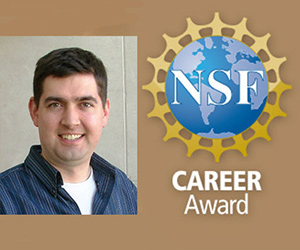Downey Bestowed NSF CAREER Award
Prof. Downey was bestowed the award from NSF'S Division of Information and Intelligent Systems (IIS) on July 29, 2014, for which he will receive a continuing grant award in the amount of $108,376.
 Prof. Doug Downey has received an Faculty Early Career Award sponsored by the National Science Foundation (NSF) for his research project on Web Information Extraction: Integration and Scaling. Prof. Downey was bestowed the award from NSF'S Division of Information and Intelligent Systems (IIS) on July 29, 2014, for which he will receive a continuing grant award in the amount of $108,376.
Prof. Doug Downey has received an Faculty Early Career Award sponsored by the National Science Foundation (NSF) for his research project on Web Information Extraction: Integration and Scaling. Prof. Downey was bestowed the award from NSF'S Division of Information and Intelligent Systems (IIS) on July 29, 2014, for which he will receive a continuing grant award in the amount of $108,376.
Prof. Downey's project studies Web Information Extraction (WIE), the task of automatically extracting computer-understandable knowledge bases (KBs) from the World Wide Web. The project addresses two key challenges in WIE. First, many different teams in academia and industry are pursuing WIE, but they lack methods for combining their KBs into a more powerful whole. This project explores how to integrate knowledge automatically across WIE systems and approaches. Secondly, a long-standing goal for WIE is to construct systems that can scale to billions of facts, by continually improving themselves over time.
The project is investigating new methods that continually optimize a WIE system with limited human intervention. The project's goal of scaling and integrating WIE systems promises to address needs in the research community, the computing industry, and the public. Methods that allow different WIE systems to seamlessly exchange knowledge could dramatically hasten the progress of Web extraction efforts currently underway in academia and industry.
For the public, advances in Web extraction promise to enable improved search engines that can assist users with tasks and answer complex questions. Further, through application prototypes, the project will provide public-facing information retrieval tools that promise to help users retrieve, understand, and analyze the Web's knowledge more rapidly. The project's research is also integrated with an education plan that includes outreach to underrepresented groups.
The Faculty Early Career Development (CAREER) Program is a Foundation-wide activity that offers the National Science Foundation's most prestigious awards in support of junior faculty who exemplify the role of teacher-scholars through outstanding research, excellent education and the integration of education and research within the context of the mission of their organizations.
Each year NSF selects nominees for the Presidential Early Career Awards for Scientists and Engineers (PECASE) from among the most meritorious recent CAREER awardees. Selection for this award is based on two important criteria: 1) innovative research at the frontiers of science and technology that is relevant to the mission of the sponsoring organization or agency, and 2) community service demonstrated through scientific leadership, education or community outreach. These awards foster innovative developments in science and technology, increase awareness of careers in science and engineering, give recognition to the scientific missions of the participating agencies, enhance connections between fundamental research and national goals, and highlight the importance of science and technology for the Nation’s future.
The Division of Information and Intelligent Systems (IIS) studies the inter-related roles of people, computers, and information. IIS supports research and education activities that 1) develop new knowledge about the role of people in the design and use of information technology; 2) increase our capability to create, manage, and understand data and information in circumstances ranging from personal computers to globally-distributed systems; and 3) advance our understanding of how computational systems can exhibit the hallmarks of intelligence.
